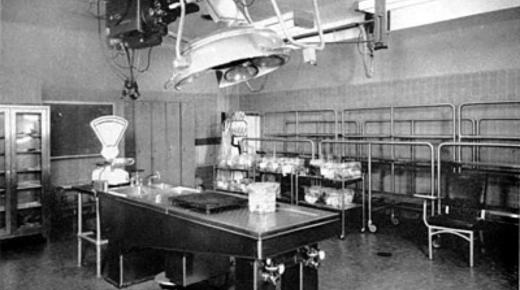Introduction to the Armed Forces Institute of Pathology
The Armed Forces Institute of Pathology (AFIP) is a renowned institution dedicated to pathology research, education, and consultation. Established to support the medical needs of the military, AFIP has grown to serve both military and civilian communities through its extensive expertise in various fields of pathology.
History and Evolution of AFIP
AFIP was founded in 1862 during the American Civil War to provide pathology services for the Union Army. Over the years, it expanded its scope to include research and education, becoming a leading institution in the field of pathology. Its contributions have been significant in advancing medical science.
Mission and Vision of AFIP
The mission of AFIP is to enhance the understanding of diseases through research, education, and consultation. Its vision is to be a global leader in pathology, providing state-of-the-art diagnostic services and advancing medical knowledge to improve patient care.
Research at AFIP
Research is a core component of AFIP’s work. The institute conducts cutting-edge research in various fields of pathology, including cancer, infectious diseases, and forensic pathology. AFIP’s research efforts have led to numerous medical breakthroughs and advancements in diagnostic techniques.
Educational Programs
AFIP offers a wide range of educational programs for medical professionals. These include residency and fellowship programs, continuing medical education courses, and specialized training in pathology. The institute’s educational initiatives aim to train the next generation of pathologists and enhance the skills of practicing professionals.
Consultation Services
AFIP provides consultation services to both military and civilian medical facilities. Its experts offer second opinions on complex cases, helping to ensure accurate diagnoses and appropriate treatment plans. This consultation service is a valuable resource for physicians dealing with challenging pathology cases.
Diagnostic Services
The diagnostic services at AFIP are comprehensive, covering various subspecialties of pathology. These services include histopathology, cytopathology, molecular pathology, and more. AFIP’s advanced diagnostic capabilities help in the accurate identification and classification of diseases.
Forensic Pathology
Forensic pathology is a significant area of focus at AFIP. The institute provides forensic pathology services to the military and other government agencies, assisting in the investigation of deaths and the identification of remains. AFIP’s forensic experts play a crucial role in solving complex cases.
Infectious Disease Pathology
AFIP is a leader in the study and diagnosis of infectious diseases. The institute’s pathology services include the identification of bacterial, viral, fungal, and parasitic infections. AFIP’s work in this field has contributed to the understanding and management of infectious diseases globally.
Cancer Research and Diagnosis
Cancer research and diagnosis are key areas of expertise at AFIP. The institute conducts research on various types of cancer, develops diagnostic tests, and provides consultation on complex cancer cases. AFIP’s contributions have significantly advanced the field of oncology.
Molecular Pathology
Molecular pathology at AFIP involves the study of diseases at the molecular level. This includes the analysis of DNA, RNA, and proteins to understand the underlying mechanisms of diseases. AFIP’s molecular pathology services are essential for the diagnosis and treatment of genetic and infectious diseases.
Pathology Collections and Archives
AFIP houses extensive pathology collections and archives, including a vast repository of tissue samples and medical records. These collections are invaluable for research and education, providing a rich resource for studying the pathology of various diseases.
Collaborative Research Initiatives
AFIP collaborates with other research institutions, universities, and government agencies to advance medical knowledge. These collaborative efforts include joint research projects, clinical trials, and the sharing of expertise and resources.
Global Health Initiatives
AFIP is involved in global health initiatives, working to improve health outcomes in developing countries. The institute provides training, consultation, and support for pathology services worldwide, helping to build capacity and improve disease diagnosis and management.
Military Medicine Contributions
AFIP’s contributions to military medicine are extensive. The institute provides pathology services to the military, conducts research on diseases affecting service members, and supports the medical readiness of the armed forces. AFIP’s work is critical for maintaining the health and readiness of military personnel.
Advanced Imaging Techniques
Advanced imaging techniques are a key aspect of pathology services at AFIP. These techniques, including digital pathology and imaging, enhance the accuracy and efficiency of disease diagnosis. AFIP’s use of cutting-edge imaging technology sets it apart as a leader in the field.
Tissue Banking and Biorepositories
AFIP maintains tissue banks and biorepositories, which store biological samples for research and diagnostic purposes. These repositories are essential for studying the pathology of diseases and developing new diagnostic and therapeutic approaches.
Publications and Dissemination of Knowledge
AFIP publishes research findings in scientific journals and presents at medical conferences, contributing to the dissemination of knowledge in the field of pathology. The institute’s publications are widely respected and cited by researchers and clinicians worldwide.
Quality Assurance and Standards
Quality assurance and adherence to high standards are fundamental to AFIP’s operations. The institute follows rigorous protocols to ensure the accuracy and reliability of its diagnostic services and research findings.
Pathology Informatics
Pathology informatics at AFIP involves the use of information technology to manage and analyze pathology data. This includes electronic medical records, laboratory information systems, and data analytics. Pathology informatics enhances the efficiency and effectiveness of pathology services.
Patient Care and Support
AFIP is dedicated to improving patient care through its diagnostic and consultation services. The institute’s work helps ensure accurate diagnoses, effective treatment plans, and better health outcomes for patients. AFIP’s commitment to patient care is central to its mission.
Ethics and Professionalism
Ethics and professionalism are core values at AFIP. The institute upholds the highest standards of ethical conduct in its research, education, and clinical services. AFIP’s commitment to integrity and professionalism is reflected in all aspects of its work.
Training and Development for Pathologists
AFIP offers extensive training and development opportunities for pathologists at all stages of their careers. This includes residency programs, fellowships, and continuing education courses designed to enhance the skills and knowledge of pathology professionals.
Future Directions and Innovations
AFIP is continually exploring new directions and innovations in pathology. This includes developing new diagnostic techniques, advancing molecular and genetic research, and improving pathology education and training. AFIP’s forward-thinking approach ensures its continued leadership in the field.
Conclusion
The Armed Forces Institute of Pathology is a vital institution dedicated to advancing the field of pathology through research, education, and clinical services. Its contributions to military and civilian medicine are significant, and its commitment to excellence and innovation continues to drive progress in understanding and treating diseases.

